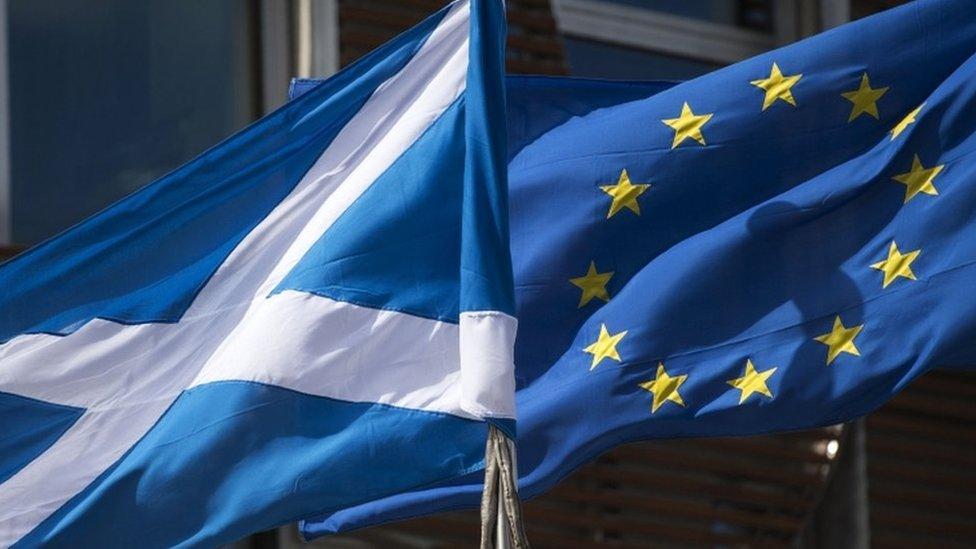Awkward squad or team player? Indy Scotland in Europe
- Published
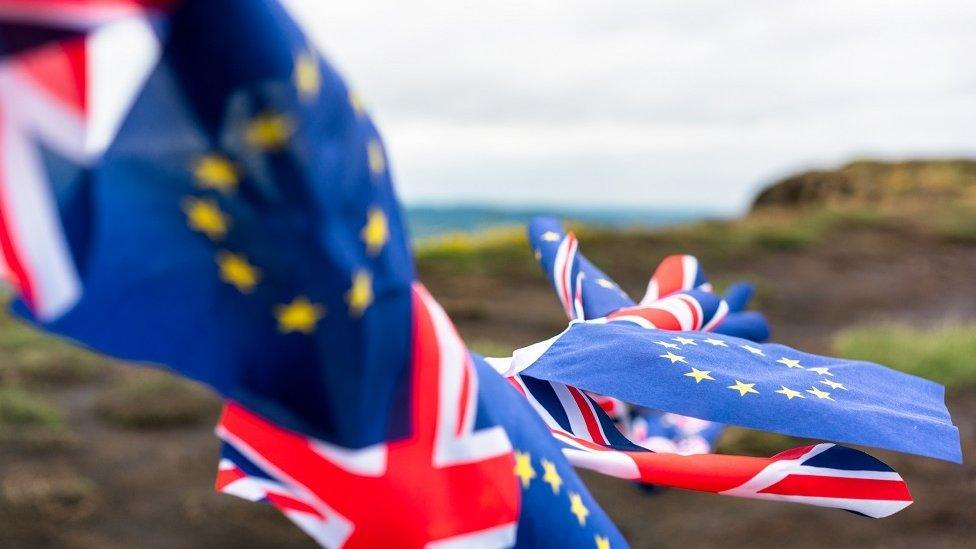
With growing pressures, attention is turning to Scotland's options outside the United Kingdom. Fabian Zuleeg is an expert who knows the current Scottish position well.
He is warning that membership would take time: it would have to be strictly constitutional: it would be rules-bound: it couldn't simply take Britain's seat.
Other EU members might welcome the precedent set by Scottish membership, but they would expect Scotland to be a team player, accepting unpalatable rules on fisheries and fiscal control.
It would be "inconceivable" that a bid by an independent Scotland to rejoin the European Union faced rejection.
But be careful to read the terms and conditions, warns Fabian Zuleeg - an Edinburgh University graduate who now leads the European Policy Centre in Brussels and is on the advisory panel on Brexit convened by the Scottish government.
He has taken a closer look at a question that gets a lot of attention in one corner of social media - what if Brexit were followed by a Scottish exit from the EU? And what if the sovereign parliament at Holyrood applied to rejoin the European Union?
Much of the answer is constitutional. We've learned, through the Brexit process, that the EU is nothing if it is not a creature of laws and rules.
Zuleeg is clear that Scotland could not expect to bend the rules: only to hasten the process of joining. And even with some haste applied, it would still take "a few years".
For one thing, Brussels institutions will want to ensure that "both divorces" are completed.
The continuing 27 members of the EU would want to be clear that Scotland's split from the United Kingdom is strictly constitutional.
The Madrid government has long been seen as a potential block on an independent Scotland's application for EU membership, for fear that it might encourage others - notably Catalonia.
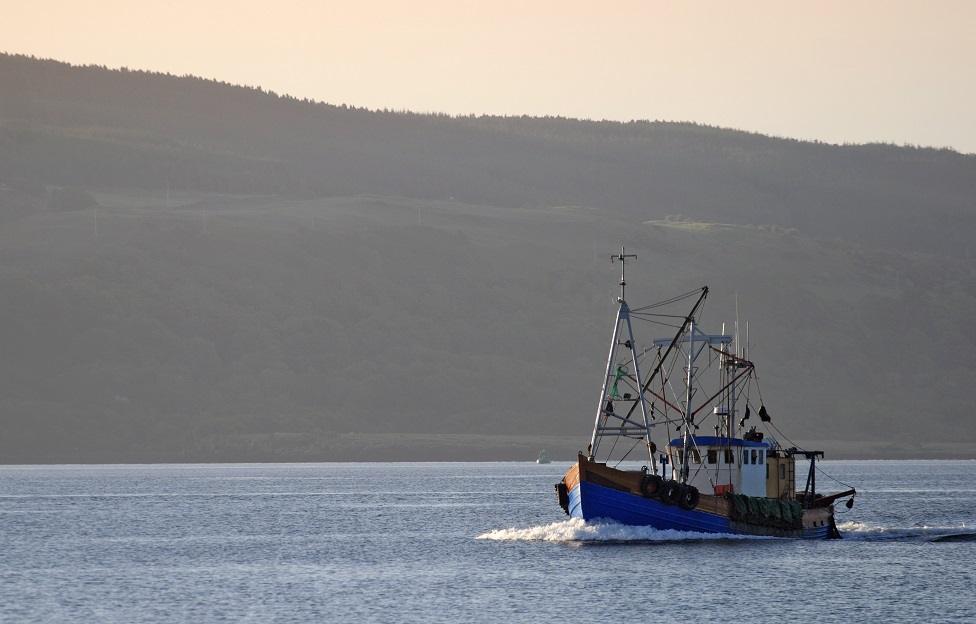
Any hopes of special treatment over the Common Fisheries Policy should be dropped, says this report
That obstacle has become less likely if the UK were no longer to be within the EU club. Until Brexit, there was a solidarity between member state capitals.
But as a club that sees itself adhering strictly to constitutional rules and laws, it would still want to be clear that Scotland had gained independence on terms agreed with the rest of the UK.
Opt-outs
Membership of the European Economic Area is suggested by Dr Zuleeg, but not as a half-way house in which Scotland takes up permanent residence. The momentum and commitment to full membership would have to be "full and unconditional... real and sustainable".
This expert in the policy and politics of Brussels emphatically rejects the notion that Scotland could take the UK's seat in the Council of Ministers. The relationship would be an entirely new one, albeit with a familiar face and accent at the table.
It follows that an independent Scotland would not inherit the opt-outs carved out carefully to meet demands from Westminster for exceptional status.
Obviously, that includes joining the Euro once the conditions are fulfilled, though it is conceded in this policy brief for the EPC that such a shift could take a long time.
Cherry picking
"Strictly no cherry picking" is the warning. "No special treatment."
That includes being a net payer and accepting free movement of people, both key issues in persuading people to vote Leave in the EU referendum. A written constitution might be required? Scotland could live with that. It might even be welcome.
But then, there's the Common Fisheries Policy. Even among Europhiles, there's been a nod and a wink that Scotland could get some special treatment where Whitehall failed to ask for any. This briefing paper suggests, external such hopes should be dropped.
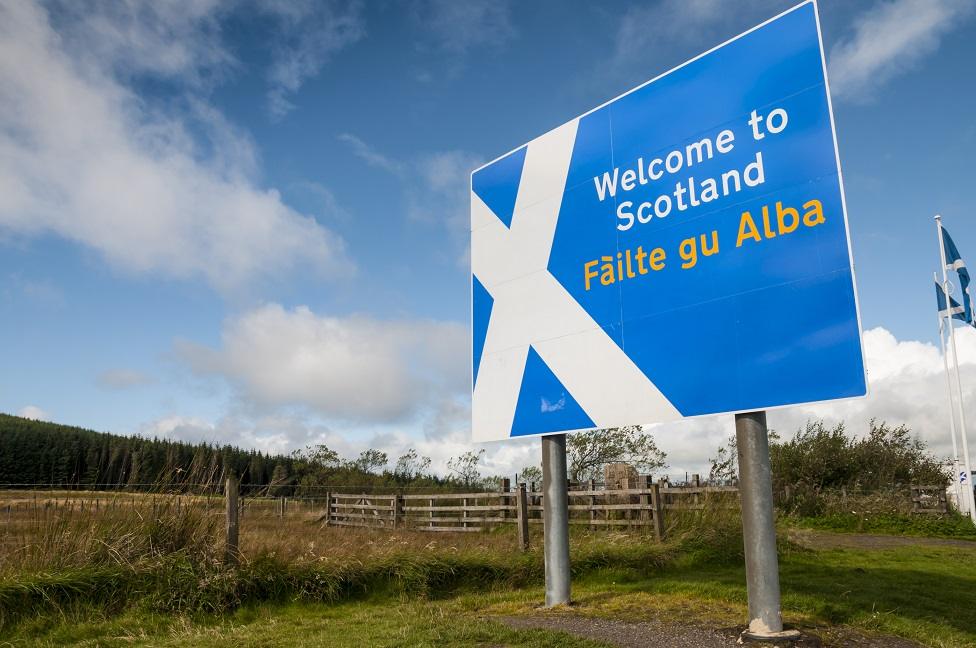
There is a hint that the border with England could be problematic if an independent Scotland was to join the EU
A Scottish voice in the Council of Ministers would be listened to, no doubt. But if out-voted by other fishing nations, the rules would have to be adhered to.
Any special measures would be temporary and would have to be clearly, logically argued, for instance maintaining Scotland's position - as with the UK and Ireland now - outside the Schengen area with its frictionless travel.
There's a hint there that the border with England could be problematic - if not so much for the rest of Europe, then certainly for the Scottish economy. And there's no discussion of how the border question might follow the impasse around Ireland's border. There is, importantly, no international peace treaty resting on a frictionless border at Gretna and Berwick, so while complex, it need not be intractably so.
Reliable
Don't pretend it will be easy or straight foward, warns Zuleeg. "Scotland must show that it could provide stability. Economic or social chaos post-separation from the UK would need to be avoided, for example in relation to fiscal-debt policy, which could be challenging in a post-Brexit environment."
On the question of the inherited government deficit, that's something of an understatement. An independent Scotland's first challenge would be to square the 3% limit on fiscal deficits with the apparent gap between spending and taxation within the UK. A similar, but less acute problem, arises with the 60% ceiling on government debt, as a proportion of Gross Domestic Product (annual total output from the economy).
But there's a strong positive message as well as a warning. An independent Scotland, post-Brexit, would send a message to the rest of Europe that at least this north-west part of the EU is showing determination to remain European, reflecting positively on the big project.
And the message goes out to secessionists in other parts of the EU, pushing for a Grexit, Frexit or Italexit: you may wish to leave the EU, but it could split up your country.
The clearest message is that an independent Scotland would have to be clear about EU membership. It could not bring to the table the same doubts that have defined the UK's difficult relationships with Europe for 50 years and more.
"It would have to demonstrate its intention to be a reliable pro-Eruopean partner," writes Fabian Zuleeg. "The last thing the EU would want is to replace one awkward partner with another".
- Published17 May 2019
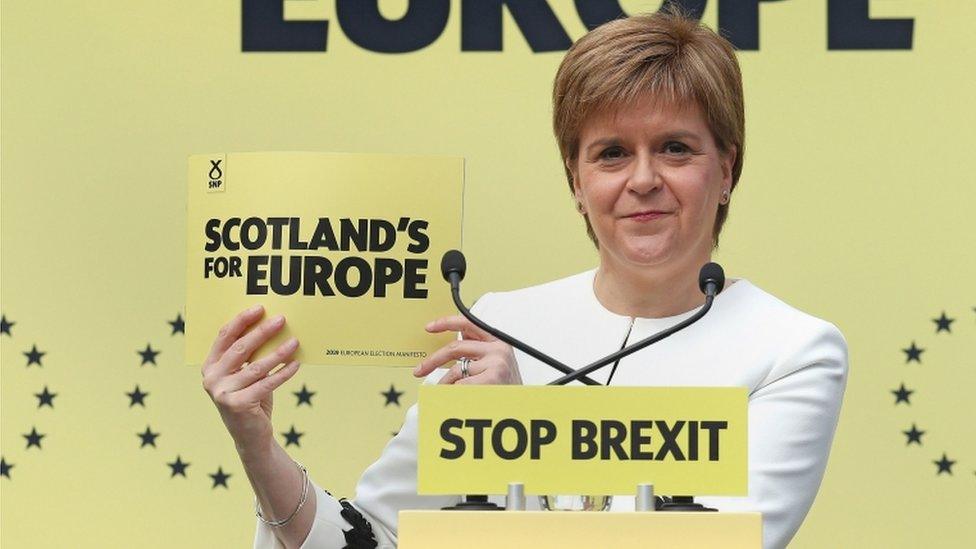
- Published7 March 2019
